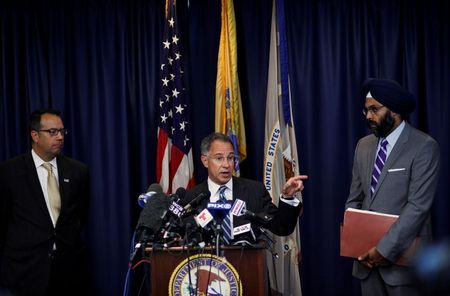By Chris Prentice
WASHINGTON (Reuters) – When former New Jersey Attorney General Gurbir Grewal starts work at the U.S. Securities and Exchange Commission (SEC) on Monday, he will be the agency’s first incoming enforcement director without recent ties to corporate America since 2005.
For two decades, the Wall Street watchdog has largely drawn its top enforcement cops from the white-collar defense attorneys bar, which critics say creates conflicts of interest that deter officials from properly punishing misconduct.
Grewal, 48, landed the role running the 1,300-person SEC unit after predecessor Alex Oh quit days into the job due to issues related to her private practice work. Progressives, including non-profit the Revolving Door Project, pushed for her ouster, in a political fracas that will put pressure on Grewal to deliver results.
“Grewal’s background is very encouraging,” said Eleanor Eagan with the Revolving Door Project. “We will be watching.”
The first Sikh-American attorney general, Grewal became New Jersey’s chief law enforcement officer in 2018. Other than two stints in private practice, he has spent the majority of his career as a federal prosecutor in Brooklyn and New Jersey, and as chief prosecutor for Bergen County.
While best-known for his work targeting police brutality and Trump administration policies, Grewal has prosecuted or overseen a slew of financial crime cases.
“Gurbir has risen so far so fast people forget he’s a real white-collar lawyer,” said Zach Intrater, a former federal prosecutor who pursued white collar crimes alongside Grewal including a $200-million Ponzi scheme.
As chief of New Jersey’s economic crimes unit from 2014 to 2016, Grewal pored over bank transaction reports to dig up cases, said Intrater.
“He has real chops in this area,” he added.
’20-HOUR-A-DAY GUY’
Grewal declined to be interviewed, but ten former colleagues and lawyers familiar with his work told Reuters he is known to be exceptionally well-prepared in court, undaunted by challenging cases, and dogged.
“Gurbir enjoys a reputation as being a 20-hour-a-day guy,” said John Carney, who ran the same economic crimes unit from 2002-2005.
Tough enforcement is a priority for Democrats who say the Trump administration was soft on Wall Street. Under Trump, the SEC focused much more on smaller-scale fraud instead of big corporations, according to Georgetown law professor Urska Velikonja.
In contrast, the sources said, Grewal will be willing to pursue big companies and challenge them in court rather than settling for a fine, a common practice which Democrats say doesn’t deter corporate wrongdoing.
“As a career prosecutor accustomed to the courtroom, he won’t be afraid to aggressively push matters to trial,” said Carney.
As New Jersey Attorney General, Grewal sued major companies including ExxonMobil Corp, DuPont and Unilever as part of an environmental justice initiative.
According to Paul Fishman, a former federal prosecutor who hired Grewal in 2010, he is also willing to pursue complex technology-based cases which are on the rise as prosecutors lean more on data analysis and target fintech firms and cyber crimes.
Grewal has overseen hundreds of cryptocurrency investigations and in 2015 prosecuted hackers who sold inside information stolen from corporate press releases.
Still, taking on big businesses is notoriously risky. Last month, the Supreme Court sided against Grewal when he tried to stop energy companies using state land.
Some question whether Grewal has enough securities law expertise to take on big, complex cases.
“It is a highly technical area of law and it’s going to be a learning curve,” said Erik Gerding, a University of Colorado law professor.
Former colleagues said Grewal is measured and unlikely to bite off more than he can chew.
“Gurbir is someone who will look to hold decision-makers in companies accountable, but also understands the investing public wins when justice is served,” said Craig Carpenito, former U.S. Attorney for New Jersey, who has worked with Grewal.
“Sometimes that means walking away from a case when you don’t have it.”
‘THICK SKIN’
Grewal joins an SEC already ramping up enforcement.
Acting chair Allison Lee earlier this year gave senior enforcement staff power to open probes which had been stripped from them by the previous leadership.
She also reversed a 2019 policy that critics said made it too easy for companies to continue doing business as usual once they entered settlement negotiations.
SEC chair Gary Gensler has also pledged to aggressively pursue individuals and companies for misconduct.
“This isn’t going to be an SEC with a lot of fear,” said Intrater.
The son of Indian immigrants, Grewal said he moved into government as result of the September 11, 2001, attacks.
“I began to think folks didn’t understand that you could look different and still love and serve this country, so that was my trigger,” Grewal said at a 2020 Montclair State University commencement.
As state attorney general, his agenda generally leaned left. His initiative to publish incidents of police violence and overhaul use-of-force policies won praise from the American Civil Liberties Union, but drew criticism from some law enforcement advocates.
He sued the Trump administration over environmental rollbacks and fought its immigration policies. And as Bergen County prosecutor and later as attorney general, Grewal fought towns’ restrictions on religious observance by Jewish communities.
He has spoken candidly about his own experiences of racism, telling PBS in 2018: “I’ve developed thick skin throughout my career.”
(Reporting by Chris Prentice; Editing by Michelle Price and Nick Zieminski)





